More than two billion people worldwide lack access to reliable, safe drinking water. Challenges around managing water resources are complex and wide-ranging. They are interlinked with those affecting land and food systems and are exacerbated by the climate crisis. Four scholars propose ways to prompt progress in water governance — and highlight just how crucial it is for local communities to be involved.
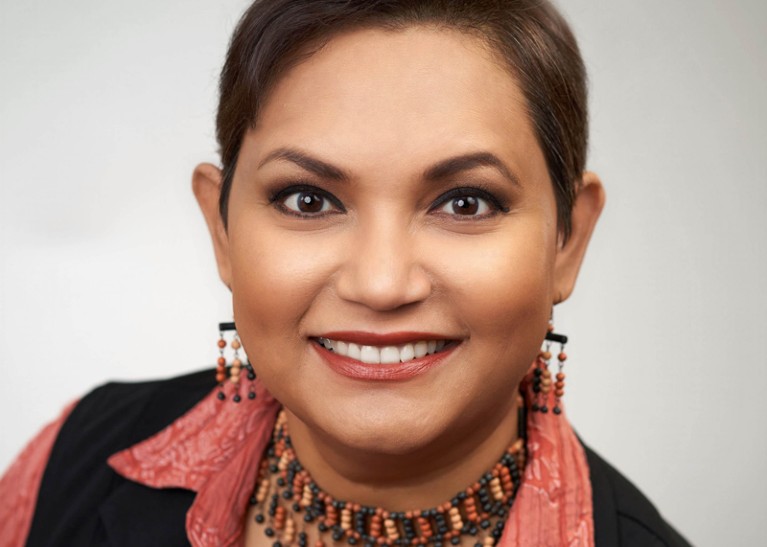
Farhana Sultana approaches research on environmental harms and social inequities in tandem.Credit: Wainwright Photos
FARHANA SULTANA: Collaborate to advance water justice
Table of Contents
Throughout my childhood in Dhaka, Bangladesh, the frantic call ‘Pani chole jaitese!’ (‘The water is running out!’) prompted my family, along with the entire neighbourhood, to scramble to fill pots and buckets with water before the taps ran dry. I witnessed women and girls walk long distances to secure this basic necessity for their families, long before water governance became central to my academic career. Amid water insecurity, the opposite extreme was just as familiar — going to school through devastating floods and experiencing the fall-out from disastrous cyclones and storm surges.
Municipal water services in Dhaka also struggled to meet the growing demands of a rapidly urbanizing and unequal megacity. Access to electricity — needed to run water pumps — was sporadic, and there weren’t enough treatment plants to ensure clean water for millions of residents.
These early experiences fuelled my dedication to tackling water injustices. Today, as an interdisciplinary human geographer with expertise in Earth sciences, and with policy experience gained at the United Nations, I approach environmental harms and social inequities in tandem — the root causes that connect both must be addressed for a just and sustainable future. My research also encompasses climate justice, which is inextricably linked with water justice. Climate change intensifies water-security concerns by worsening the unpredictability and severity of hazards, from floods and droughts to sea-level rise and water pollution.
Such events hit marginalized communities the hardest, yet these groups are often excluded from planning and policymaking processes. This is true at the international level — in which a legacy of colonialism shapes geopolitics and limits the influence of many countries in the global south on water and climate issues — and at the national level.
However, collaborative work between affected communities, activists, scholars, journalists and policymakers can change this, as demonstrated by the international loss-and-damage fund set up last year to help vulnerable countries respond to the most serious effects of climate-related disasters. The product of decades of globally concerted efforts, this fund prioritizes compensation for low-income countries, which contribute the least to climate change but often bear the brunt of the disasters.
I also witnessed the value of collaboration and partnership in my research in Dhaka. Community-based groups, non-profit organizations and activists worked with the Dhaka Water Supply and Sewerage Authority to bring supplies of drinking water at subsidized prices to marginalized neighbourhoods, such as Korail, where public infrastructure was missing.
Globally, safe water access for all can be achieved only by involving Indigenous and local communities in water governance and climate planning. People are not voiceless, they simply remain unheard. The way forward is through listening.
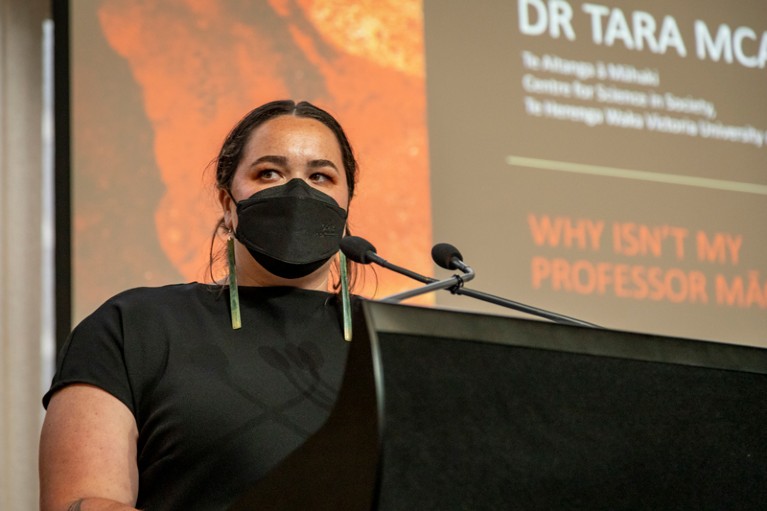
Tara McAllister is exploring the interface between Mātauranga Māori (Māori Knowledge) and non-Indigenous science.Credit: Royal Society of New Zealand
TARA MCALLISTER: Let Māori people manage New Zealand’s water
I have always been fascinated by wai (water) and all the creatures that live in it. Similar to many Indigenous peoples around the world, Māori people have a close relationship with nature. Our connection is governed by geneaology and a concept more akin to stewardship rights than to ownership. This enables us to interact with our environment in a sustainable manner, maintaining or improving its state for future generations.
I was privileged to go to university, where I studied marine biology. I then moved to the tribal lands of Ngāi Tahu on Te Waipounamu, the South Island of New Zealand, which triggered my passion for freshwater ecosystems. Intensive agriculture is placing undue pressure on the whenua (land) and rivers there. Urgent work was required. Undertaking a PhD in freshwater ecology, I studied the causes of toxic benthic algal blooms in rivers. For me, there is no better way to work than spending my days outside, with my feet in the water.
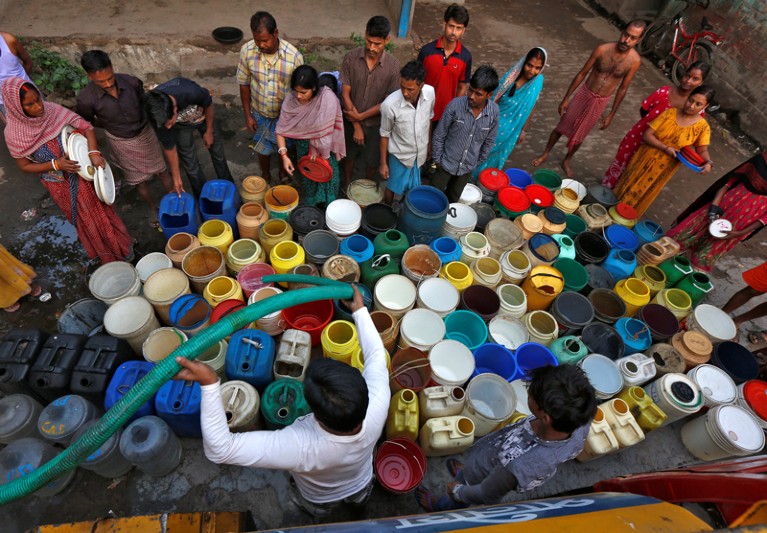
A worker fills people’s water containers from a tanker in Kolkata, India.Credit: Rupak De Chowdhuri/Reuters
Having just started a research position at Te Wānanga o Aotearoa, a Māori-led tertiary educational institution, I am now exploring the interface between Mātauranga Māori (Māori Knowledge) and non-Indigenous science, and how these two systems can be used alongside each other in water research. I have also been working on nurturing relationships with mana whenua, the community that has genealogical links to the area where I live, so that I can eventually work in the community’s rivers and help to answer scientific questions that its members are interested in.
Despite a perception that Aotearoa (New Zealand) is ‘clean and green’, many of its freshwater ecosystems are in a dire state. Only about 10% of wetlands remain, and only about half of rivers are suitable for swimming. Water resource management is challenging, because of a change this year to a more right-wing government. The current government seems intent on revoking the National Policy Statement for Freshwater Management, established in 2020.
This policy has been crucial in improving the country’s management of freshwater resources. Although not perfect, it does include Te Mana o te Wai — a concept that posits that the health and well-being of water bodies and ecosystems must be the first priority in such management. It is now in danger of being repealed.
I think that, ultimately, our government’s inability to divulge control and power to Māori people to manage our own whenua and wai is what limits water resource management. More than any change in policy, I would like to see our stolen lands and waters returned.
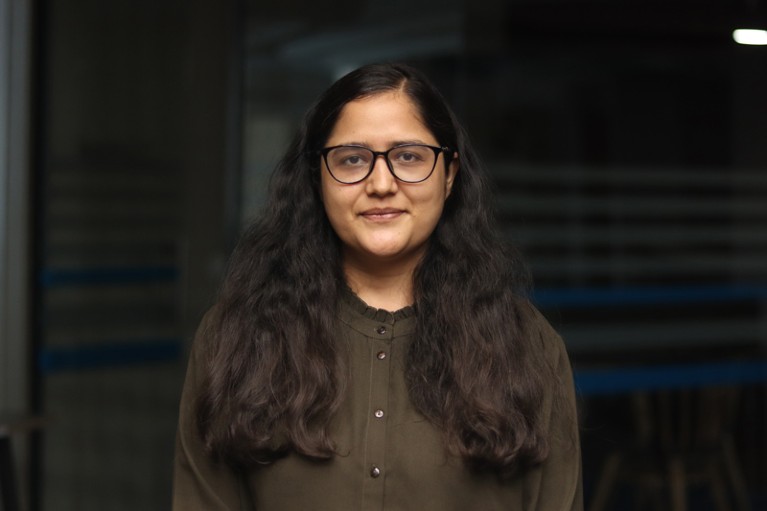
Suparana Katyaini calls for more policy support for Indigenous-led water management.Credit: Milan George Jacob
SUPARANA KATYAINI: Consider water, food and land together
Growing up in New Delhi, I always had easy access to drinking water — until the summer of 2004, when a weak monsoon triggered a water crisis and the city had to rely on water tankers. I realized then that good management of water resources supports our daily lives in ways we take for granted until we experience scarcity.
My professional journey in research and teaching has been motivated by this experience. During my environmental studies of water poverty in India, I noticed that the field relied largely on quantitative data over qualitative insights — the degree of water-resources availability, access and use are typically assessed through metrics such as the water-availability index or the water-demand index. But in many places, Indigenous and local communities, including farmers and women in any occupation, have collectively developed skills to weather periods of water scarcity. Paying attention to these skills would lead to better water management. For example, the issue of food and nutritional insecurity in water-scarce areas in the state of Odisha, India, is being solved by Bonda people through revival of the crop millet, using varieties that are nutritious, water-efficient and climate-resilient.
But these efforts need more policy support. My current work at the Council on Energy, Environment and Water explores how water, food and land systems are interlinked in India, and how better understanding of these relationships can inform policies. I am looking to identify similarities and differences in objectives of national and regional policies in each sector, as well as exploring whom they affect and their intended impacts. The aim is to move towards unifying water, food and land governance.
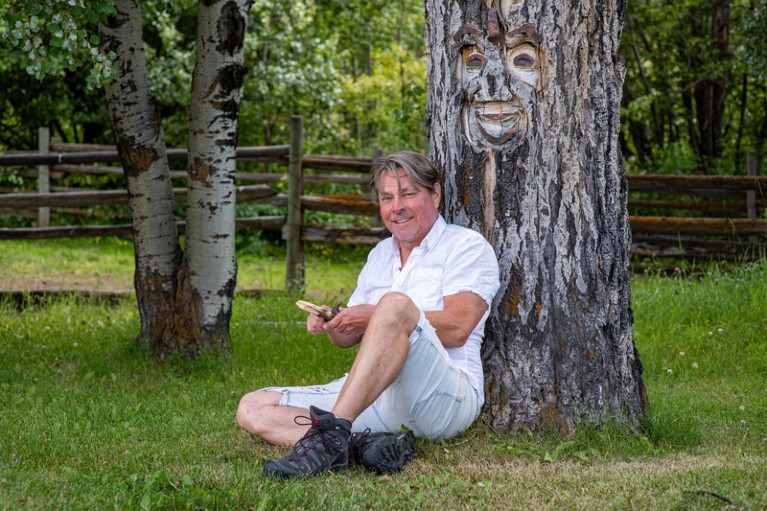
Michael Blackstock examines climate change from a water-centred perspective.Credit: Mike Bednar
MICHAEL BLACKSTOCK: Shift attitudes towards water
In 2000, I conducted an ethnographic interview with Indigenous Elder Millie Michell from the Siska Nation in British Columbia, Canada, that transformed my interest in water from intellectual curiosity to passion. She passed a torch to me that fateful day. During our conversation for my research about the Indigenous spiritual and ecological perspective on water, she asked me: “Now that I shared my teachings and worries about water, what are you going to do about it?” She died of a stroke a few hours later.
As an independent Indigenous scholar, I went on to examine climate change from a water-centred perspective — drying rivers, downpours, floods and melting ice caps are all water. This approach, for which I coined the term ‘blue ecology’, interweaves Indigenous and non-Indigenous ways of thinking. It acknowledges water’s essential role in generating, sustaining, receiving and, ultimately, unifying life on Mother Earth. This means changing our collective attitude towards water.
In 2021, I co-founded the Blue Ecology Institute Foundation in Pavilion Lake, Canada, which teaches young people in particular to acknowledge the spiritual role of water in nature and in our lives, instead of taking it for granted as a commodity or ecosystem service. Giving back to nature with gratitude is also crucial. Such restrained consumption — taking only what is needed — would give abused ecosystems time to heal.
A focus on keeping water healthy can help to guide societies towards more sustainable environmental policies and climate-change resilience — and ensure that future generations will survive with dignity. Critics say, ‘Blue ecology is kinda out there.’ In my view, however, ‘here’ is not working.
